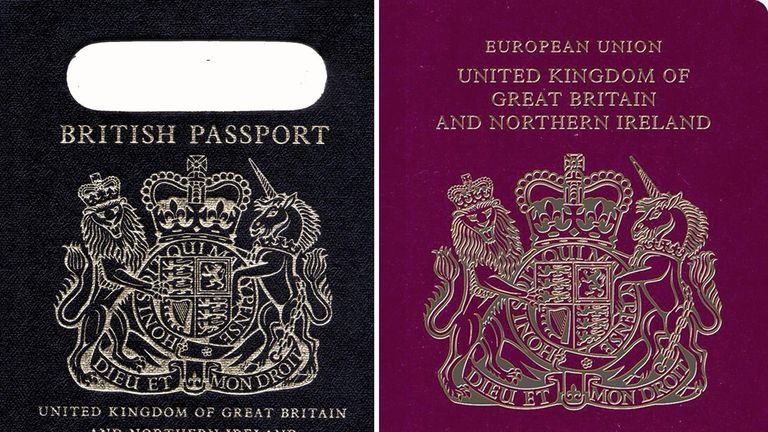Opinion: A passport is about national identity
Andrew Rosindell, Conservative MP for Romford, gives his take on why changing UK passports is about more than just colour.
Friday 22 December 2017 11:14, UK
The current burgundy coloured EU passports will be replaced in phases, and all references to the European Union will be dropped.
Andrew Rosindell, Conservative MP for Romford, writes for Sky News about why the change is symbolic, and why it is about more than just a new design.
As we have voted to leave the EU, I welcome the Government's decision to re-introduce the iconic dark blue design as a powerful symbol of Britain's independence from Brussels.
Just as our flag represents national sovereignty, our symbolism is one of the defining features of independence.
It is not about the colour of the passport, something which pro-EU commentators have wilfully misunderstood, but where it derives from.
We are restoring our national identity, and the importance of symbols comes from the emotion it inspires within people.
The founders and current bureaucrats of the European Union never wanted it to remain a trading community.
Unlike trading organisations such as NAFTA (North American Free Trade Agreement) the EU has an anthem, flag and parliament.
Such imagery is required to define a claim to statehood, a way to harmonise an artificial construct such as the EU.
That is why there was an outcry when the EU tried to have the phrase "Her Britannic Majesty" removed from our passports.
A similar objection occurred in 2000 when Brussels attempted to introduce European stars instead of the Royal Coat of Arms.
This issue of passports is not a British obsession either, after dodging the prospect of lilac passport, the European Community took many years to reach the wine-coloured consensus in 1981.
As the European project expanded and integrated, the diversity of nation states was gradually eroded with more uniformity.
Once described as "perfection itself", our beloved Navy-blue passports in use since 1920 were lost and Britain was forced to accept the design in 1988.
Our British identity was slowly but surely being submerged into an artificial European one, something many Brits felt increasingly unhappy about.
As such, Leave campaigners were either ridiculed or ignored when they warned we were on the road to a United States of Europe, but the mask slips when politicians such as the ex-President of European Parliament Martin Schulz openly calls for a United States of Europe by 2025.
We must never forget that Britain's civil and tolerant nature derives from our own traditions and not those handed down to us by the Eurocrats.
Our centuries old recognition of individual rights began the long march towards the liberal democracies we take for granted today, British symbols and documents such as the Magna Carta represented the freedoms inherited across the world.
We have often observed developments across the Channel, and too often we have witnessed social, political and economic upheaval, lawlessness and authoritarian rule.
We should never forget what we inherit.
It was wishful thinking that Brits would capitulate their identity to an artificial supranational state which has only existed for a few decades, instead of their own nation which has evolved traditions from over 300 years of history.
United Kingdom nationals can once again feel pride and self-confidence in their own nationality when travelling.
National identity matters and there is no better way of demonstrating this today than by bringing back this much-loved national symbol when travelling overseas.
The restoration of our own British passport is a clear statement to the world that Britain is back.
That is why the mythmakers who dream of a federal United States of Europe will always ridicule any patriotic overtones to restoring our sovereignty and national identity.





